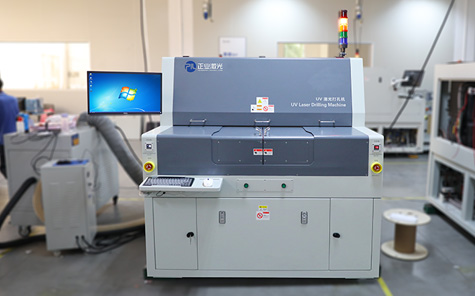Solution
Application of UV laser drilling and UV laser cutting technology in FPC industry
The earliest FPC punching was mainly realized by mechanical method, but with the continuous development of high density FPC, mechanical drilling technology can no longer meet the market demand of small diameter, high precision and high efficiency of punching.
Since the end of 1990s, laser drilling has gradually replaced mechanical drilling and has become the mainstream processing technology for FPC board micropores. the corresponding laser drilling equipment has also developed rapidly. Compared with mechanical punching, ultraviolet laser FPC punching has higher resolution and smaller processing aperture. at the same time, because the laser head does not contact the workpiece and there is no tool wear, it has obvious cost advantage. Considering the cost performance and other aspects, the range of pore size and the preferred punching process are usually adopted: holes above 150 μ m are machined; 150 - 100μ m holes are drilled by CO2 laser; Below 100μ m, cutting with ultraviolet UV laser.
Co2 laser drilling machine equipment is also in a leading position in the market. its products are serialized, effectively aiming at the processing of copper foil, packaged circuit boards and large-size printed circuit boards.
UV laser drilling equipment is available from ESI in the United States, lpkf in Germany, Mitsubishi in Japan, etio in Shenzhen and topaz in Wuhan. Among them, ESI is the leader in the execution industry. Mitsubishi follows closely; 355 nm all-solid ultraviolet laser is used to form FPC, which can meet the requirements of laser cutting and drilling.
Compared with foreign countries, the development and promotion of domestic laser drilling equipment started relatively late. Wuhan top silver and Shenzhen Etienne, Guangdong Zhengye and Shenzhen large family lasers use 355 nm all-solid state laser sources. the system processing precision is 20 μ m, and the minimum hole diameter for blind hole drilling can reach 25 μ m, which is still some distance from ESI and other foreign equipment.









